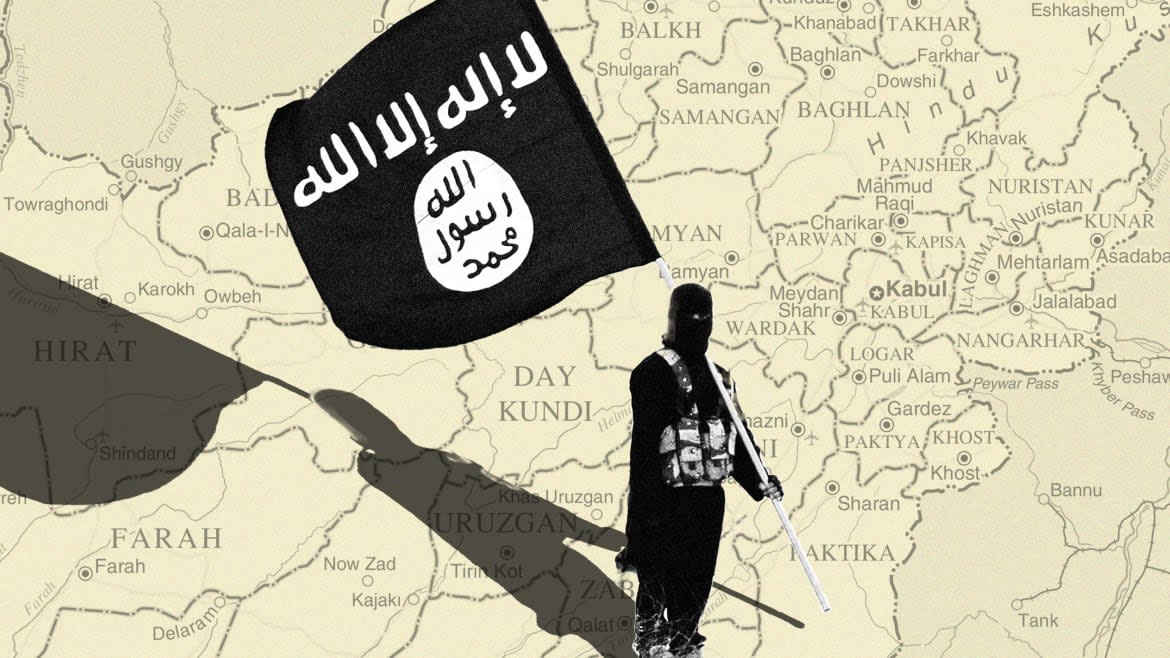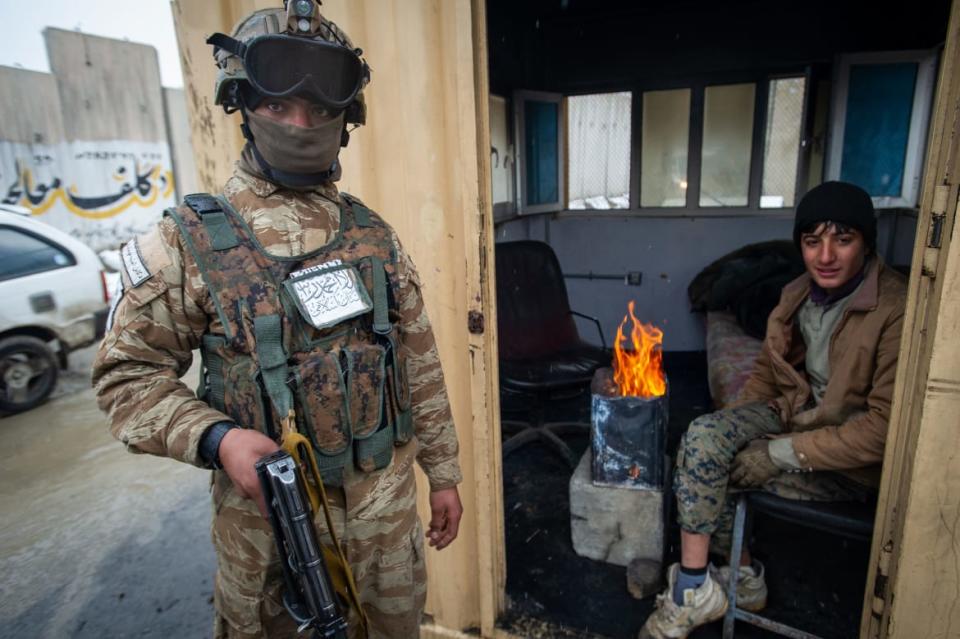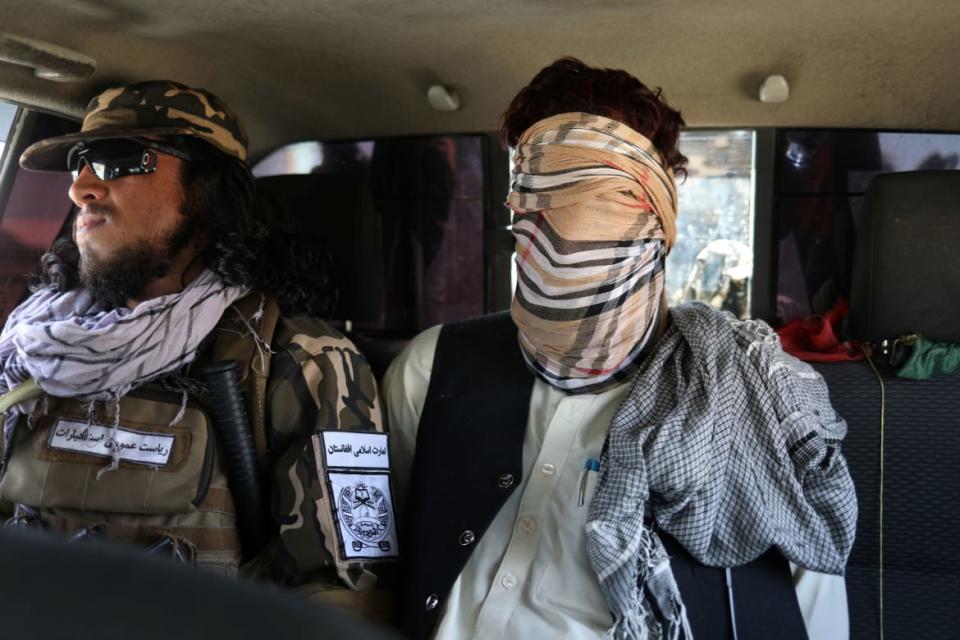ISIS Is Back and Threatens to Be Deadlier Than Ever

It was a little over two weeks since Mohammad Ali Raihani, 28, a student of engineering at Kabul University, had started a day job to provide for his brother and sister while he studied. On Jan. 6, an explosion ripped through the minibus taking him to the printing press where he worked, killing him and six others.
“He studied at night so he could work during the day and support the family. He was our only breadwinner,” his sister Sumaya Raihani told The Daily Beast, choking back tears. “When Mohammad got this job, he was always telling us to study. He promised to buy a bicycle for my younger brother to encourage him to study harder.”
Sumaya has been unable to work or go to school herself under the brutal restrictions on women and girls imposed since the Taliban took over Afghanistan in August 2021.
As well as cruelty and misogyny, Taliban rule has also brought a resurgence in the threat from ISIS. The Sunni Muslim terror group has been allowed to re-group and re-tool in Afghanistan where thousands of fighters are training and plotting attacks, despite Taliban claims that they are trying to clamp down on them.
Hundreds of people—like Mohammad—have already been killed in dozens of attacks inside Afghanistan and in the wider region this year, as part of a new campaign of violence announced in January called “Kill Them Wherever You Find Them.” The campaign was originally billed as a plan to target the Jewish community in response to Israel’s bombing of Gaza after the Oct. 7 attacks, but has since seemingly expanded to include other groups that ISIS deems heretical.
The explosion that killed Mohammad was the first of two attacks that week targeting a neighborhood in Kabul with a majority population of Shia Muslims of Hazara ethnicity. The attacks were claimed by the Islamic State of Khorasan (ISKP), the wing of ISIS based in Afghanistan.

Iran’s President Ebrahim Raisi visits one of the people injured in the Islamic State attack in Kerman, Iran, on Jan. 5, 2024.
The biggest of the ISIS attacks so far this year was a double suicide bombing in Iran that killed over 100 people at a memorial for Qassem Soleimani, a top commander in the Islamic Revolutionary Guard Corps. While the Iranian government blamed Israel for the attack, a U.S. intelligence report released shortly after confirmed to the media that “the U.S. has pretty clear intel” that ISKP had conducted the attack.
A former Afghan security official told The Daily Beast that ISIS would continue to grow in Afghanistan, where there is a huge supply of weaponry left behind following the U.S. withdrawal. He said an expanded ISIS would start to plan attacks on targets across the world if the Taliban continues to effectively allow them to set up a new haven.
A New Home for ISIS
The Taliban, who have been downplaying the threats posed by ISKP, won’t admit to the scale of their ISIS problem. The Taliban have been struggling to seek international recognition for their government in Afghanistan, and to attract investment into the flailing economy amidst crushing sanctions from the U.S. and its allies.
The Taliban government is trying to portray itself as a viable international partner in counter-terrorism, despite continuing to maintain close ties with al Qaeda and Tehrik Taliban Pakistan (TTP), allowing the militant groups to mobilize, recruit and train on Afghan soil. A U.S. operation in 2022 targeted and killed Ayman al-Zawahiri, the al Qaeda chief in a house in an upscale Kabul neighborhood linked to a top Taliban member.
Efforts to get the Taliban government recognized internationally have had marginal success with the Chinese, who have directed some investment into the oil and mining sectors, and more recently, became the first country to officially accept the credentials of a Taliban ambassador. However, ISKP attacks on the few remaining diplomatic missions in Kabul and on business interests have damaged the Taliban’s illusion of security in Afghanistan.
According to the latest U.N. Security Council report, released in February, despite being largely diminished from its peak presence in 2014-19, ISIS in Afghanistan has seen a resurgence since the Taliban takeover and “managed to undermine Taliban security by carrying out multiple high-profile attacks.”
Why America Just Set Free the ‘Pablo Escobar of Afghanistan’
The U.N. report noted that, since 2022, the group has claimed more than 190 suicide bomb attacks in major cities in the region, resulting in over 1,300 casualties. In 2022, the ISKP conducted large-scale attacks on the embassies of Pakistan, Russia and several Chinese interests in Kabul. In fact, the ISKP attacks in 2022 were found to be “greater lethality than in 2021,” according to the UNSC.
“Over the past year, the group has benefited from increased operational capabilities and freedom of movement inside Afghanistan. It seeks to maintain the intense pace of attacks,” the UNSC report noted, adding that its member states had assessed ISKP as “the most serious current terrorist threat in Afghanistan” with growing local recruitment and movement of fighters from Arab and African States to Afghanistan.

Taliban fighters at a security checkpoint warm themselves by a fire on Jan. 17, 2022, in Kabul.
While an accurate assessment of the strength of ISKP is not possible, the UNSC report estimates that there are between 4,000 and 6,000 ISKP members in Afghanistan, including family of the fighters. Most of them are mobilized in training camps in the north and northeastern parts of the country where loyalties to the Pashtun-majority Taliban are fluid owing to the ethnic tensions between the largely non-Pashtun population.
A former Afghan security official who has been monitoring the movements of local and foreign fighters through existing intelligence networks shared similar numbers. “The largest group among them are Afghans and Pakistanis, but there are significant fighters coming from Syria, Bangladesh, India, and Central Asian countries,” he told The Daily Beast on condition of anonymity.
“With the Taliban in charge of counter-terrorism, Afghanistan is on its way to becoming a safe haven for global terrorists, including the ISKP who are regrouping in the region,” the ex-official said. “Right now, most of these groups [in Afghanistan] are still mobilizing and their attacks are limited to the region, but if allowed to gain a geographical base, groups like ISIS will be empowered to conduct larger, more deadly attacks globally,” he warned.
The Taliban’s own failures in government are contributing to the surge in recruitment, the ex-official said. “Before the fall of the Afghan government, recruitment into all regional insurgent groups followed the same narrative, calling for a fight against the U.S.-backed government. But since the U.S. withdrawal and the Taliban takeover, ISKP has directed its efforts at amplifying its anti-Taliban propaganda,” he said.
The UNSC report noted an increase in ISKP’s media operations in the region with “new publications releasing content in 12 languages and building a network of Telegram channels as part of an ongoing internationalization strategy.” Recent pamphlets issued by ISIS media have repeatedly referred to the Taliban as murtad (apostates). “They criticise the Taliban for defending ‘infidels’ through their protection of foreign embassies and the United Nations in Afghanistan,” the report stated.
While UNSC noted that much of ISKP funding came from its parent organization, as well as from other non-governmental sources and donors, the ex-official added that the group also has access to weapons left behind by U.S. and NATO forces. “Afghanistan is currently flush with U.S. weapons. It is very easy right now to build a war chest in Afghanistan with weapons that were left behind by foreign forces, and those sold by former fighters for reasons of money or sympathies, defecting fighters often take weapons and ammunition with them,” he said.
Will the Taliban Really Fight ISIS?
Security analysts observing the situation in the region warn that connections between terrorist groups should not be ignored. “One must understand Taliban-ISKP relations in the context of Islamist Jihadism,” said Omar Sadr, senior research scholar at University of Pittsburgh. “The ideological divide between various Jihadist groups, including the Taliban and the ISKP, is extremely porous. Many Taliban militants embrace ISKP's extremist transnational Salafi worldview,” he said, adding that there were several ex-ISKP members who joined the Taliban and vice versa.
Factionalism within the Taliban has also played a significant part in the situation on the ground, Sadr added. “While some Taliban follow the traditional Hanafi sect, others sympathize with the international jihadist movement,” he said, adding that the Taliban might even at times leverage select ISKP channels as a strategic weapon against Afghanistan’s neighbors such as in case of attacks on Iran.

A suspected ISIS member sits blindfolded in a Taliban Special Forces car in Kabul, Afghanistan, Sept. 5, 2021.
The Taliban, he said, tolerate transnational jihadis as long as they do not pose a substantial existential threat, leaving little motivation to resolve Afghanistan’s ISIS problem. It was after all the Taliban that released a number of ISKP captives upon their takeover of Kabul, Sadr pointed out, referring to multiple jailbreaks in August 2021 across Afghanistan.
It was later confirmed that several of those ISKP prisoners were involved in major attacks in Kabul, including an airport bombing on Aug. 26 that killed nearly 200 people, including 13 U.S. service members.
The Afghan ex-official added, “The ISKP are also exploiting these fractures and factionalism. They are also seeking out those among the radicalized fighters within the Taliban who are disillusioned with their leaders seeking support and recognition from erstwhile enemy countries.
“They have been laying the groundwork [against Taliban] for years, but with recent evidence [of the Taliban working with foreign governments] they have been able to draw in larger numbers of fighters from across Afghanistan and globally,” the former security official said.
The regrouping of ISKP fighters in Afghanistan is terrible news for religious and ethnic communities already marginalized by the Taliban at home, and it is about to become a massive problem for Washington and other Western capitals in the battle against global terrorism.
Get the Daily Beast's biggest scoops and scandals delivered right to your inbox. Sign up now.
Stay informed and gain unlimited access to the Daily Beast's unmatched reporting. Subscribe now.


